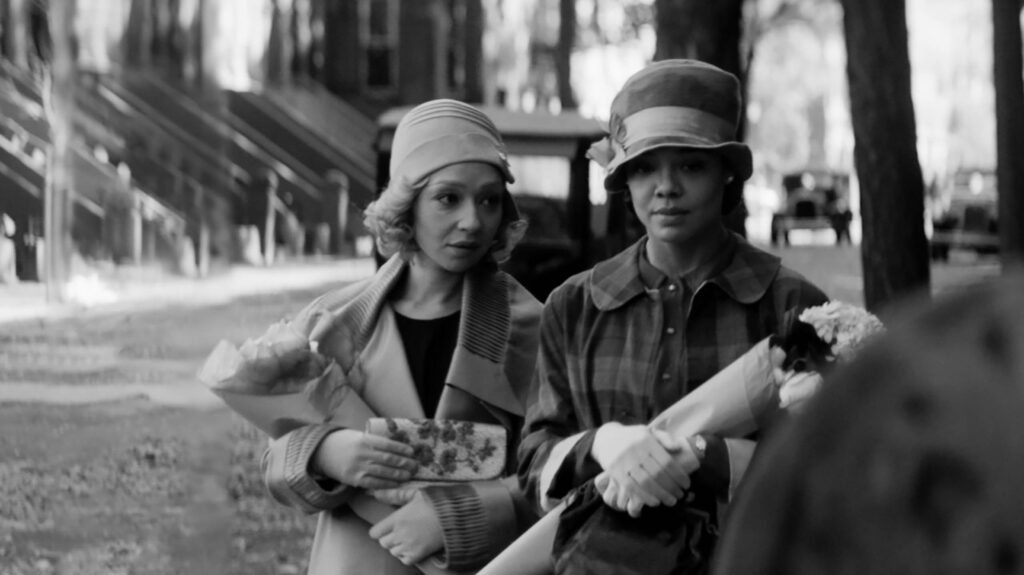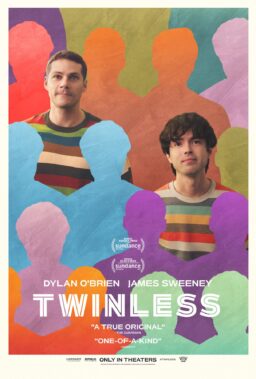Three very different films premiered on Saturday, the biggest day for the 2021 Sundance Film Festival. Set in different time periods in different parts of the world, these movies are a snapshot of the diversity of stories being told virtually out of Park City.
The best of the three is “Passing,” Rebecca Hall’s adaptation of the 1929 Harlem Renaissance novel of the same name by Nella Larsen. The acclaimed actress proves to be an ambitious filmmaker, tackling a challenging story of race, sexuality, class, and culture in the 1920s. She also proves to be a deft director of performance, bringing out the best of her notable cast, particularly her incredibly talented leads. There are aspects of “Passing” that feel a bit too preciously rendered—it’s very refined in terms of craft, almost to a fault—but this is a drama that will have people talking when it’s released. It’s a conversation piece in every way, and those are always the films that matter most.
The wonderful Tessa Thompson plays Irene Redfield, an upper-class 1920s woman who takes refuge from the heat in the tearoom at the Drayton Hotel in New York City. She’s passing, pretending to be white to access a place that Black people weren’t allowed at the time, and that’s where she runs into Clare Kendry (Ruth Negga), an old high school classmate doing the same. However, Clare isn’t just passing for the day, she’s doing so in every aspect of her life, including in her marriage to a grotesquely racist man played by Alexander Skarsgard, the king of sketchy husbands. Irene returns to her home in Harlem with her two children and her husband Brian (André Holland), but Clare finds her way to that side of the color line, going to parties with the Redfields. It leads to a subtle and nuanced examination of racial boundaries and definitions, amplified by issues of sexuality that would have been equally daring at the time this book was published.
Hall takes a very lyrical, poetic approach to her storytelling, boxing her characters into a 4:3 aspect ratio and shooting in luscious black & white with long silences. She often places boxes within boxes, shooting people through doorways that further shrink the tight frame. It’s all so carefully considered from the detailed costume work to the haunting piano score that it can feel a bit cold in terms of character. Luckily, Thompson and Negga make up for that, finding emotional notes that keep the piece relatable. Thompson can do anything as an actress, finding ways to reflect multiple layers of Irene’s inner monologue on her expressive face. While looking like she could easily have been a major star in silent cinema, the captivating Negga matches Thompson in her own register, conveying subtly how much her reunion with someone from a different life has reshaped her foundation.
“Passing” has the kind of complex filmmaking that I wish could be discussed at bars and parties in Park City this year. It’s a film that grows when one rolls it around their brain, and I imagine will produce some of the best writing of 2021, both pro and con. We need more of those movies. (Editor’s Note: Chaz Ebert, Publisher of this site, is an Executive Producer on this film but had no impact over this review.)

There was a bit of tonal whiplash for this viewer going from Harlem in the 1920s to the French countryside horror movie of Sean Ellis’ “Eight for Silver,” but that can sometimes be the fun of the film festival experience. Monster movies fans should take heed that there’s a gruesome, ambitious one coming their way, one that runs a bit too long and might want to go back and polish up some of its VFX, but still an impressive thrill ride of unflinching horror.
Seamus Laurent (Alistair Petrie) is a vicious land baron, someone who owns a giant manor with his wife (Kelly Reilly) and children and will do whatever it takes to hold onto his property, including slaughtering a clan of the Romani who have staked a claim to it. The sequence in which Laurent and his men massacre, burn, and mutilate the people on the land is startling, shot mostly at a distance but still powerful. And then Laurent learns that doing something that horrible has consequences. Laurent’s son Edward (Max Mackintosh) starts having dreams that draw him to the field where all of this happened, and then goes missing. A visiting pathologist named John McBride (Boyd Holbrook) knows there’s something vicious in the woods, and it wants its vengeance.
“Eight for Silver” will be too much of a slow burn for action horror fans, but it definitely gets to the gruesome stuff and pulls no punches when it does. Some of the imagery here, especially in a horrifying scene that recalls John Carpenter’s “The Thing,” will be enough on its own for fans of the genre, but there’s more going on here than mere jump scares. “Eight for Silver” really gets under your skin, and it feels dangerous and dirty. It legitimately feels threatening, like anyone could be disemboweled at any given moment. That tension is hard to maintain for two hours, and some of the climax here suffers from the budget, but there’s still enough to like, including another game performance from Holbrook, who could make a career as a cinematic monster hunter and I’d be pretty happy. He feels like an old-fashioned lead in a Hammer movie, totally understanding what’s needed of him here in terms of charisma and urgency.

Finally, two couples meet for an emotional, unimaginable conversation in the writing and directorial debut of “Cabin in the Woods” and “Dollhouse” star Fran Kranz, “Mass.” Both are parents facing the enduring pain of losing a child, but their common grief comes in different colors because one pair are the parents of a school shooting victim and the other the parents of the shooter, who then took his own life. Formally reserved to the extreme, almost the entirety of Kranz’s film takes place in a church meeting room, giving the entire production the feeling of a one-act play, but it lacks the intensity it would have in that format, where the emotions of the characters could feel more tangible than they do here. It’s an experiment in real-time drama that dissipates in its intensity and power just as it’s getting through its emotional climaxes.
Kranz sets his deliberate tone early in his 110-minute film by providing a long prologue in which the people who work at the film’s only setting get ready for what’s about to happen there. After that, the heart of the production kicks in with the introduction of two sets of unnamed parents—Richard (Reed Birney) & Linda (Ann Dowd) and Jay (Jason Isaacs) & Gail (Martha Plimpton). The latter couple has decided they need to talk a few things through with Richard & Linda if they’re ever going to move into the next phase of grieving the loss of their son. Gail brings a righteous anger early in the meeting, wondering how the other parents could have missed warning signs. Richard & Linda insist it’s not as clear-cut as the press made it out to be. It never is.
The complex emotional issues that circle through “Mass” like nature vs. nurture and blaming parents for their children’s actions give it some emotional heft, but Kranz’s dialogue too often sounds scripted, increasingly so as the film reaches its boiling point. Isaacs steals the movie, allowed to perform in an emotional register he doesn’t often get to tap, and Dowd can do just about anything. But this really does feel through and through like a theatre writing project, an actor’s showcase that plays somewhere Off Broadway, earns rave reviews for its cast, and then gets adapted into a movie that opens it up a bit more than “Mass” is willing to do.












